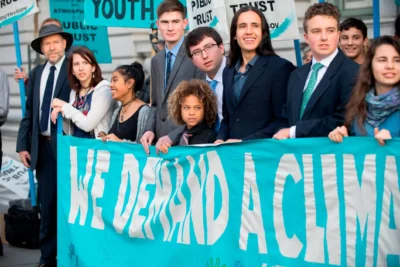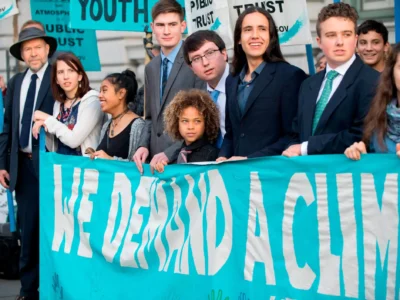Hey there, folks. Let’s talk about a major moment in the world of environmental law and climate policy. This month, we’ve seen the curtain fall on a lawsuit that’s been the talk of the town in legal circles for quite some time: Juliana v. United States. It’s a case that’s been making waves since it first hit the federal district court in Oregon back in 2015, and it’s been a roller coaster ride ever since.
A Deep Dive into Juliana v. United States
Now, let me give you the scoop on what’s been going down with this case. You’ve got 21 young guns, backed by the Oregon non-profit Our Children’s Trust, taking on the big guns of the federal government. Their argument? That the government’s been dragging its feet on tackling climate change, and that’s not just bad news for the environment; it’s trampling on the rights of these kids under the public trust doctrine and constitutional principles of substantive due process. This case was in the hands of U.S. District Court Judge Ann Aiken, who wasn’t having any of the government’s procedural shenanigans and was all set to take this to trial.
The Ninth Circuit’s Take on Standing
But here’s the kicker: The U.S. Court of Appeals for the Ninth Circuit has thrown a wrench into the works. For the second time in four years, they’ve said that these plaintiffs, as passionate and prepared as they are, don’t have the legal standing to bring this lawsuit in federal court. Back in 2020, the court was split on this, and they recognized that the plaintiffs had a mountain of evidence showing the government knew fossil fuels were bad news for the climate but kept on promoting them anyway. The majority of the judges felt this was a problem for politicians to solve, not the courts.
But Judge Josephine Staton wasn’t having it. She called out the government for recognizing the dire situation but still barreling towards disaster. She believed the plaintiffs had every right to bring their case and that the courts could handle it without stepping out of line.

2020’s Opinions and Their Impact
Those 2020 opinions were packed with some powerful stuff from both sides of the bench. Following that procedural hiccup, the plaintiffs tweaked their complaint, hoping to clear those standing hurdles the Ninth Circuit had pointed out. The district judge gave them the thumbs up, denied the government’s motion to dismiss, and penciled in the trial for later in the year.
But just when you thought we were heading back to court, the Ninth Circuit swooped in with a brief four-page order. No muss, no fuss, just a straight-up command to the district court to dismiss the case, no do-overs allowed. That’s right, the Juliana lawsuit has officially been stopped in its tracks.
Presidential Opposition and the Frustrating Outcome
Now, here’s a little tidbit you might find interesting: Three different presidents—Obama, Trump, and Biden—have all been on the same page when it comes to fighting off the Juliana lawsuit. They’ve all been keen on keeping this case out of the trial phase, sticking to procedural defenses to keep the lid on this “impressive case for redress.”
This outcome, after nearly a decade of legal tussles, has got to be a tough pill to swallow for the plaintiffs, their lead attorney Julia Olson, and the supporters who’ve been in their corner with hope and perseverance.
The Silver Lining in Climate Change Litigation
But it’s not all doom and gloom. Despite the roadblocks and setbacks, the efforts of the Juliana case and other climate change litigation have made some waves. They’ve sparked conversations, raised awareness, and shown that there’s a real hunger for action on climate change.
So, while the Juliana v. United States case might be bowing out, the fight for environmental justice and policy reform is far from over. It’s clear that these issues are on the minds of many, and the push for change is only going to grow stronger.
Keep your eyes peeled, folks, because the story of climate change litigation is still being written, and it’s bound to be full of twists and turns. Stay tuned.
Did you miss our previous article…
https://pardonresearch.com/?p=3700
